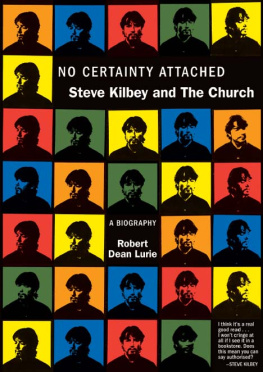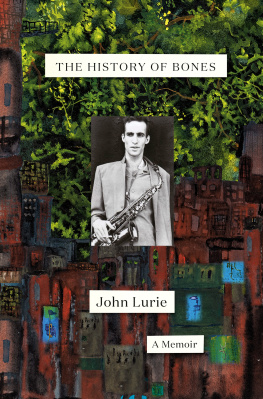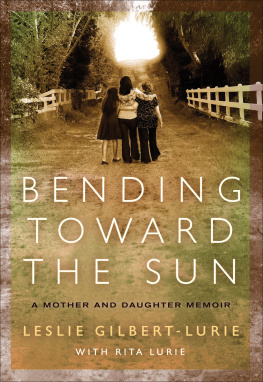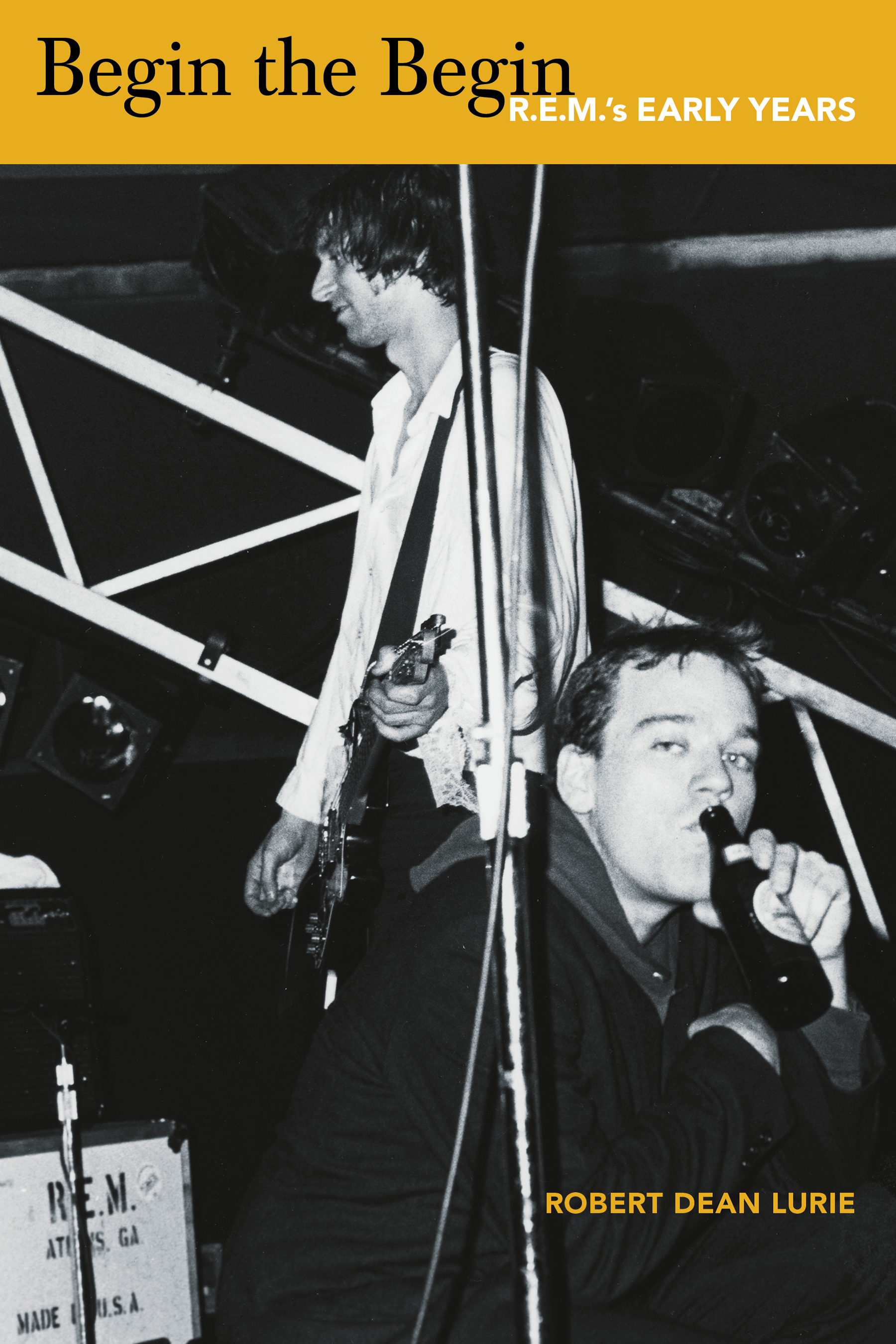Begin the Begin
R.E.M.s Early Years
Robert Dean Lurie
Verse Chorus Press
For David and Susan Lurie
Contents
Do these people realize that this is pure impressionism? I close my eyes and all I see are pastels, and I listen and all I hear are gliding blocks of tone.
Betty Hendricks Carlton Minder (Orts mother), on hearing R.E.M.s Harborcoat
I reveal self sparingly and deliberately so people can really do what they want, and it clearly is mysterious.
Jonathan Omer-Man
Authors Note
Several books have already been written about R.E.M., a few of which Fiction by David Buckley, Perfect Circle (previously published as Remarks and Remarks Remade ) by Tony Fletcher, and Reveal by Johnny Blackare very fine examples of music journalism and near-definitive treatments of the R.E.M. saga as a whole. But most of the R.E.M. biographies to date (including those listed above) were written by British authors and, first and foremost, for UK audiences. Perhaps inevitably, they tend to overlook many significant details about Athens and the American South. I get the sense that their depictions of the region have been largely shaped by the comments of the band members themselves. But since the claims of Bill Berry, Peter Buck, Mike Mills, and Michael Stipe to authentic Southernness are (as we shall see) tenuous at best, to attempt to appraise this unique locale through their eyes can be a bit like squinting at a blurry photo of a blurry photo. The people and places of the South are crucial to the R.E.M. story in ways far more complex and interesting than have been presented thus far, and it has been my intention in what follows to provide a more thorough assessment. I make no claim to factual infallibility, but I do bring to this task the benefit of having lived in Athens specifically, and the South generally, for a significant portion of my adult life.
There is another major reason why I feel this book needed to be written. I have been aware for some time that several local figures who were pivotal in the bands early history have been underrepresented in previous accounts, even completely omitted in some cases. All biographers must be selective, of course, and there are plenty of personalities I have left out due to space considerations, lack of interview availability, heavy coverage elsewhere, or my own blind spots. But Im proud to have incorporated Ort, Pat the Wiz, Velena Vego, Jeff Walls, Chris Edwards, Billy Holmes, and others into the R.E.M. saga. They all deserve to be here.
I also believe there is value in returning to people and events with the benefit of knowing the full arc of the R.E.M. story. Many, though not all, of the earlier books were written and published in the thick of R.E.M.s mainstream success. The ending of the story was not yet known, and because the band were still a going concern, some interviewees were reluctant to divulge personal details. Such reticence has dissipated considerably in the years since R.E.M. disbanded in 2010.
I would be remiss if I did not single out one writer who has gotten the details mentioned above absolutely right. Rodger Lyle Browns book Party Out of Bounds covers the early Athens scene as a whole. He has both the Southerners gift for colorful detail and the luck of having been present at (and participated in) the inception of said scene. Party Out of Bounds has been invaluable to my understanding of these events, and I recommend it without reservation. (And yes, Ort features in that one.)
Like any dutiful journalist I have attempted to obtain the participation of the members of R.E.M. themselves. Traditionally, their approach to biographies has been hands-off (with the exception of the various versions of Tony Fletchers book and the occasional single-member interview). In response to my enquiries, Bertis Downs, R.E.M.s manager, explained, The band doesnt really take a positionpeople are welcome to write [biographies], and we dont generally have much to do with them. This is understandable, particularly now that the band is no more. It could even be argued that the members of R.E.M.especially Peter Buckhave been overinterviewed by the press through the years, and as a result have developed standard responses to most biographical questions. It is more interesting to the long-term fan, I would argue, to offer the stories the band members havent told, as well as alternative interpretations of the well-worn mythology. This book attempts to explore those threads whenever possible.
Prologue
A needle drops on a record. The static crackles and pops. And then, emerging from a space between the speakers, the galloping of horses hoovesin the form of guitar arpeggios, bass harmonics, tom-tomspounding the riverbanks, heralding an arrival. Then a shrieknot the kicked-in-the-groin yelp of Robert Plant or Steven Tyler, more the startled exhalation of a young Confederate soldier caught in the chest with buckshot. Then:
Suspicion yourself, suspicion yourself, dont get caught.
Suspicion yourself, suspicion yourself, let us out.
This is the illusion, and the truth. Dispatches from a South that never existed, from Southerners who were not really Southern. Who reinvented pop music without having any credentials for the job. Four young men of middling talent who left the door ajar and were just as surprised as anyone when scattered fragments of genius blew in. Perhaps they wanted to sound like the Velvet Underground but didnt have the patience to stick with that Heroin drone. Maybe they wanted to mimic Television but none of them had the chops of a Tom Verlaine or Richard Lloyd. The singer wanted to be Patti Smith, but his fondness for Tammy Wynette kept getting in the way. Through no fault of their own, and against all logic, they ultimately upstaged many of their influences. And they arrived at their accidental stardom via a series of carefully calculated steps.
In a corner garden, wilder lower wolves!
Huh?
***
I arrived in Athens, Georgia, in 1992, a decade late. I missed all of the events described in this book. But the ghosts of the towns fabled music scenethe loose collective of college students and sundry misfits that had birthed the B-52s, Pylon, and R.E.M.still lingered. Like Ross Shapiro, a wiry, dark-haired guy of indeterminate age who regaled customers at the Gyro Wrap with tales of that seemingly long-ago time. By 1986 I was already talking about the old days, hed say wistfully as he carved thin slices of meat off a rotating spit. And there were the members of R.E.M. themselveswho were not ghosts at all, really, but not exactly corporeal either. In 1992 they all still lived in the Athens area and were striving mightily to hang on to the notion of being a small-town band. They navigated the waters of their recent international fame a little shakily, doing their best, at home, to ignore the dropped jaws and wide-eyed stares of newly arrived University of Georgia (UGA) freshmen who were unschooled in how to handle sudden close proximity with celebrity. R.E.M.s supposedly reclusive singer, Michael Stipe, hit the town just about every night and could typically be found hovering on the periphery of the audience at the 40 Watt Clubchecking out performances by new bands (the Daisy Group) or old friends (Bob Mould, Robyn Hitchcock), or ambling out the front door of the Globe, always unshaven, always wearing a hat, and usually rolling a cigarette. On rare occasions the entire band might be glimpsed ensconced in a booth at this or that bar, their animated discussions of their next move blending into the innocuous chatter all around them.
The unspoken rule around town was to leave them alone, and apart from some of those overeager freshmen, or the frat boys who periodically hassled Stipe, people abided by it. Still, when youve got a lot of people in a cramped space, all keenly aware of the identities of the men in the corner, all trying mightily not to look, not to stare, the air itself takes on a nervous energy: the electricity of expectation, of anticipation, the loading up on stories to tell later.










